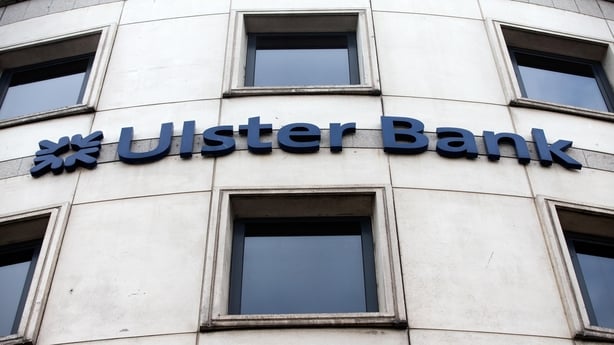For many tracker mortgage customers of Ulster Bank, today was a bitter sweet one.
A record fine levied on the lender by the Central Bank was definitive recognition that they had been wronged.
But at the same time, it came too late for quite a few, including teacher Niamh Byrne.
She took out a tracker mortgage with the lender in April 2006 to buy a home.
At the time, the European Central Bank rate was climbing, so two months later on the advice of both the bank and her broker, she decided to fix for two years.
"They had assured me that I would automatically return to my tracker rate," she said.
But in July 2008, when the fixed rate expired, the bank said the mortgage would not return to a fixed rate and instead went to a variable rate.
Niamh argued with Ulster Bank for nine months until May 2009.
"At that stage it seemed like I was just arguing with a brick wall and anyone that I spoke to at that time thought the bank was correct and they didn't understand what I was trying to say to them," she said.
We need your consent to load this rte-player contentWe use rte-player to manage extra content that can set cookies on your device and collect data about your activity. Please review their details and accept them to load the content.Manage Preferences
Not happy with the situation, Niamh decided to move her loan to a different bank with a preferential rate and resolved to leave the issue go at that stage.
"I wasn't really happy with the conclusion at that time but it didn't really seem like there was anything else I could do," she said.
Three years later though, in 2012, Niamh wanted to try to move house and decided to have one more crack at getting the tracker back.
She took her case to the Financial Services Ombudsman's (FSO) office. That process took 28 months for the case to go through and during that time Niamh also exercised her right to do a data protection subject access request with the bank.

This yielded documents that indicated she probably should have retained the tracker rate.
The FSO eventually ruled that she should have got her tracker back.
But because she had moved to a different bank he decided she couldn't return to the Ulster Bank tracker.
Instead, Niamh was awarded compensation.
"When that happened I initiated a campaign of letter writing to Ulster Bank and basically was a pest to try to get my tracker back," she said.
Then in 2017 she was asked to speak about the issue before an Oireachtas committee and after that Niamh felt Ulster Bank seemed more open to returning her to a tracker.
"However, unfortunately in January of 2018 it appeared that they would only give me back my tracker rate on a more adverse rate than I had originally had," she said.
Niamh wasn't happy with that, so she continued to argue, despite Ulster Bank "putting up the wall" again.
In late 2018 she decided the only option available was to appeal through the formal procedures put in place under the Central Bank's Tracker Mortgage Examination.
That took a further year, until November of 2019, to come through.
"At that stage the appeal committee thought that the relationship between myself and the bank was too bad to institute a relationship again," she said.
The committee's solution was to suggest compensation be paid in lieu of getting the tracker mortgage back, which Niamh accepted.
"So really it was a traumatic period, and during that time it is kind of all encompassing, affecting your whole life," she explained.
Niamh said her finances were completely tied up for a decade because of the issue and this meant she couldn't move house.
As a result, she missed out on opportunities to buy a new home before prices climbed to the high point that they are at now..
"But even personally, the experience of being gas-lighted by the bank, you know the bank telling you that you are wrong, that you don't know what you are talking about, even though you do know what you are talking about has been very traumatic," she stated.
"And at all junctures during this process it has continued."
"You feel very sad about the life you should have had, rather than the life you did have."
Niamh is glad action was taken against Ulster Bank by the Central Bank, but she feels "terrible" for herself and the other nearly 6,000 people who were put through the ordeal "needlessly".
She also would like to see someone in Ulster Bank held personally responsible.
"People in Ulster Bank did make the decision to do that, even though they knew that it was wrong, and so far nobody has been held accountable for that," she said.
We need your consent to load this rte-player contentWe use rte-player to manage extra content that can set cookies on your device and collect data about your activity. Please review their details and accept them to load the content.Manage Preferences







